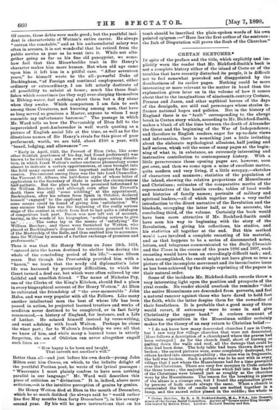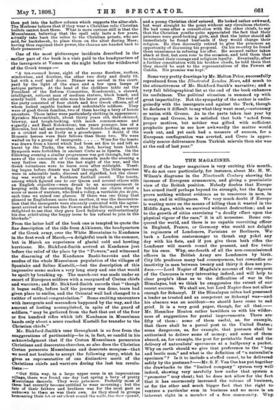CRETAN SKETCHES.* IN spite of the preface and the title,
which explicitly and im- plicitly warn the reader that Mr. Bickford-Smith's book is not a complete history either of the island of Crete or of the troubles that have recently disturbed its people, it is difficult not to feel somewhat provoked and disappointed by the desultoriness of its earlier pages. Nothing could be more interesting or more relevant to the matter in hand than the explanation given later on in the volume of how it comes about that to the imaginations of nineteenth-century Cretans, Perseus and Jason, and other mythical heroes of the days
of the demigods, are still real personages whose stories in- fluence national hopes and policies. But in the history of
England there is no "fault" corresponding to the abrupt break in Cretan story which, according to Mr. Bickford-Smith, makes a blank of all the time between the death of Alexander the Great and the beginning of the War of Independence; and therefore to English readers, eager for up-to-date views and information, there is something just a little irritating about the elaborate mythological allusions, half jesting and half serious, whieh veil the sense of many pages at the begin- ning of what is, in substance, an extremely interesting and instructive contribution to contemporary history. With a little perseverance these opening pages are, however, soon got over, and then we come upon a mine of excellent matter, quite modern and very living, if a little scrappy,—sketches of characters and manners ; statistics of the population of the island, showing the relative proportions of Mussulmans and Christians ; estimates of the comparative merits of the representatives of the hostile creeds; tables of local words and histories of family names; portraits of military and spiritual leaders,—all of which together make a very useful introduction to the direct narrative of the Revolution and the blockade, occupying the latter half, or to be accurate, the concluding third, of the volume. Certainly the book would have been more attractive if Mr. Beckford-Smith could have seen his way to beginning with the story of the Revolution, and giving his reflections, his studies, and his statistics all together at the end. But this method would have involved a complete recasting of his material,
and as that happens to be a series of disconnected notes, letters, and telegrams communicated to the Daily Chronicle and the Times in the course of the years 1896 and 1897, such
recasting would have been an exceedingly difficult task ; and, when accomplished, the result might not have given so true a picture of the incomplete movement and its inconclusive issue as has been achieved by the simple reprinting of the papers in their natural order.
Some of the incidents Mr. Bickford-Smith records throw a
very interesting light upon. the position and prospects of the rival creeds. No reader should overlook the reminder "that
the native Mussulmans are descended from perverts, and feel a natural rancour against those who have dared to hold fast the faith, while the latter despise them for the cowardice of their forefathers. It is probable that a good many of them would revert, if autonomy were to come in and give Christianity the upper hand." A curious remnant of Christian superstition in the Mussnlman soldier certainly makes for the theory of an easy return to Christian belief :—
"1 do not know how many desecrated churches I saw in Crete, but I saw very few village churches that were not desecrated. [Here follows a description of a churchyard where the graves had been outraged.] As for the church itself, short of burning or pulling down the walls and roof, all the damage that could be done had been done. The holy table had been thrown down and broken ; the sacred pictures were, some completely destroyed, the others hacked into unrecognisability ; the cross was in fragments, the bell was broken. Such a picture was to be met with in every village that I saw where the Mussulmans had for a time prevailed over the Christians. There are very few mosques in Crete outside the three towns ; the majority of those which fell into the hands of the Christians were treated just as roughly as the churches were by the Mussulmans. The reason for the breaking in pieces of the altars is a strange one, but I found the explanation given by persons of both creeds always the same. When a church is consecrated the bits of candle used are melted together in lump, and the sacred relics pinged in the middle ; the whole is
• Cretan Sketches, By R. A. H. Bickford-Smith, M.A., F.B.A.. late Commit :goner of the Cretan Relief Committee. Author of "Greece under King George. 111u-trated by Belton Prior. London: Richard Bentley and Son.
then put into the hollow column which supports the altar-slab. The Moslems believe that if they wear a Christian relic Christian bullets cannot hurt them. What is more curious still is that the Mussulmans, believing that the spell only lasts a few years, actually take back the relics to the Christian priests, who are said, for backsheesh, to place them on the altar during Mass; having thus regained their power, the charms are handed back to their possessors."
One of the most picturesque incidents described in the earlier part of the book is a visit paid to the headquarters of the insurgents at Vamos on the night before the withdrawal of the Greek troops :—
"A ten-roomed house, eight of the rooms floorless, roofless, windowless, and doorless, the other two dirty and dimly lit, but with a roof and doors. Dinner was served in the court- yard by the light of the stars and a few open lamps of antique pattern. At the head of the clothless table sat the President of the Reform Committee, Kondouraki, a shrewd, intelligent, reticent man of medium stature, black beard, and sturdy build. On either side were his latest guests. The rest of the party consisted of four chiefs and five Greek officers, all of whom looked capable leaders and redoubtable soldiers. They were of good Greek families, two of them having a bevy of heroic ancestors. These latter were particularly striking in appearance : Kyriakos Mavromikbali, about thirty years old, dark-skinned, brawny, and tough-looking, with much common-sense and sigacity ; and Basil Kolokotroni, ten years younger, less of a Hercules, but tall and muscular, rather Scotch-looking, as merry as a cricket and as lively as a grasshopper. I doubt if the Homeric heroes were finer fellows than these two. We were waited on by a group of insurgents Wine for the toasts was drawn from a barrel which had been set fire to and left as burnt by the Turks, the wine, in fact, having been boiled. Symposia were forbidden in ancient Crete as in Sparta. On the following evening a similar programme was got through, but the news of the concession of Cretan demands made the evening a very festive one. It was the last night of the war, and the Greek volunteers were to leave soon after midnight. Toast- ing began before dinndr was half through. The little speeches were in admirable taste, discreet and dignified, but the cheer- ing was worthy of a Northern football crowd. The toasts, among which figured one to our Queen and several others with an English objective—were drunk to an accompaniment in keeping with the surrounding. for behind our chairs stood a score or more of warriors, who fired a volley, a veritable feu de joie, each time we raised our glasses. If there was one thing that pleased us Englishmen more than another, it was the demonstra- tion that the insurgents were sincerely contented with the agree- ment arrived at between the Powers and the Sultan, and we were delighted to see that they gave Lord Salisbury enthusiastically his due attrilcuting the happy issue to his refusal to join in the blockade."
From the latter half of the book one is tempted to quote the fine description of the ride from Alikianon, the headquarters of the Greek army, over the White Mountains to Kandanos in the first week of March,—a delightful track in the summer, but in March an experience of glacial cold and bowling hurricane. Mr. Bickford-Smith arrived at Kandanos just before the relief of the place by the "Powers," and witnessed the disarming of the Kandanos Bashi-bazouks and the exodus of the whole Mussulman population of the villages of Spaniako and Selino Kastelli,—but the description of this impressive scene makes a very long story and one that would be spoilt by breaking up. The march-out was made under an escort of European soldiers with a rearguard of Cretan chiefs and warriors; and Mr. Bickford-Smith records that "though it began sadly, before half the journey was done, tears had given place to smiles, and the Oriental wail had changed to a twitter of mutual congratulation." Some exciting encounters with insurgents and marauders happened by the way, and the amount of looting accomplished, in spite of the guard of soldiers, "may be gathered from the fact that out of the four or five hundred rifles which left Kandanos in Mussulman hands only about a score reached Kastelli for transfer to the Christian chiefs."
Mr. Bickford-Smith's tone throughout is so free from the exaggerations of partisanship—he is, in fact, so candid in his acknowledgment that if the Cretan Mussulman persecutes Christians and desecrates churches, so also does the Christian Cretan persecute Mussulmans and desecrate mosques—that we need not hesitate to accept the following story, which he gives as representative of one distinctive merit of the Christians chiefs and warriors during the last ten revolu- tions :—
" Out Sitia way, in a large upper room in an impecunious village, there was found one day last spring a bevy of pretty Mussulman damsels. They were prisoners. Probably most of them had recently become entitled to wear mourning ; but the fate of their fathers and brothers was for the most part as unknown to them as was their own. As they stood in groups bemoaning their lot or sat silent round the walls, the door opened, and a young Christian chief entered. He looked rather awkward, but went straight to the point without any circuitous rhetoric. He had come after a consult-stion with the other chiefs, to say that the Christian youths quite appreciated the fact that their prisoners were good-looking girls, and that the latter should all immediately be found husbands if they would change their religion. He then discreetly retired to give the prisoners an opportunity of discussing his proposal. On his re-entry he found them unanimous in refusing his offer. He seemed rather taken aback at first, but soon rose to the occasion, and told them that he admired their courage and religious loyalty. Eventually, after a further consultation with his brother chiefs, he told them that they should be sent to the representatives of the Powers at Candia. His promise was kept."
Some very pretty drawings by Mr. Melton Prior, successfully reproduced from the Illustrated London News, add much to the attractiveness of Mr. Bickford-Smith's narrative; and a very fall bibliographical list at the end of the book enhancea its usefulness. The political situation is summed up with great impartiality. But the sympathy of the author is undis- guisedly with the insurgents and against the Turk, though. he declares it diffieult to say what they want most,—autonomy or union with Greece. As to the parts taken last year by Europe and Greece, he is satisfied that both "acted from proper motives, but neither was gifted with sufficient prophetic power to see how awkwardly the matter would.
work out, and yet each had a measure of success, for a European conflagration was averted, and Crete is appre- ciably nearer deliverance from Turkish misrule than she was at the end of last year."







































 Previous page
Previous page